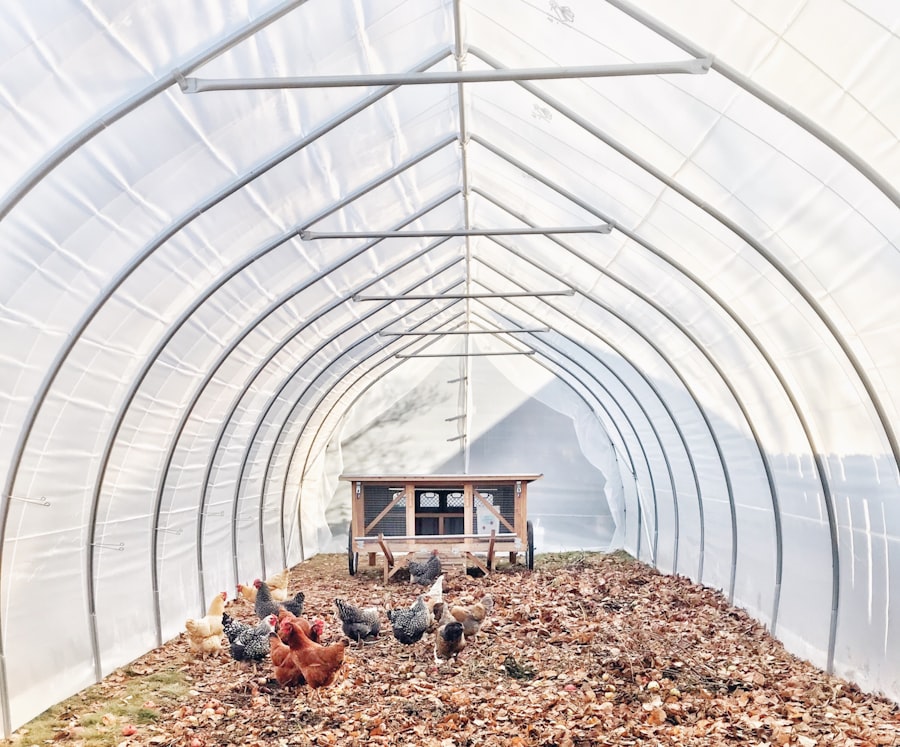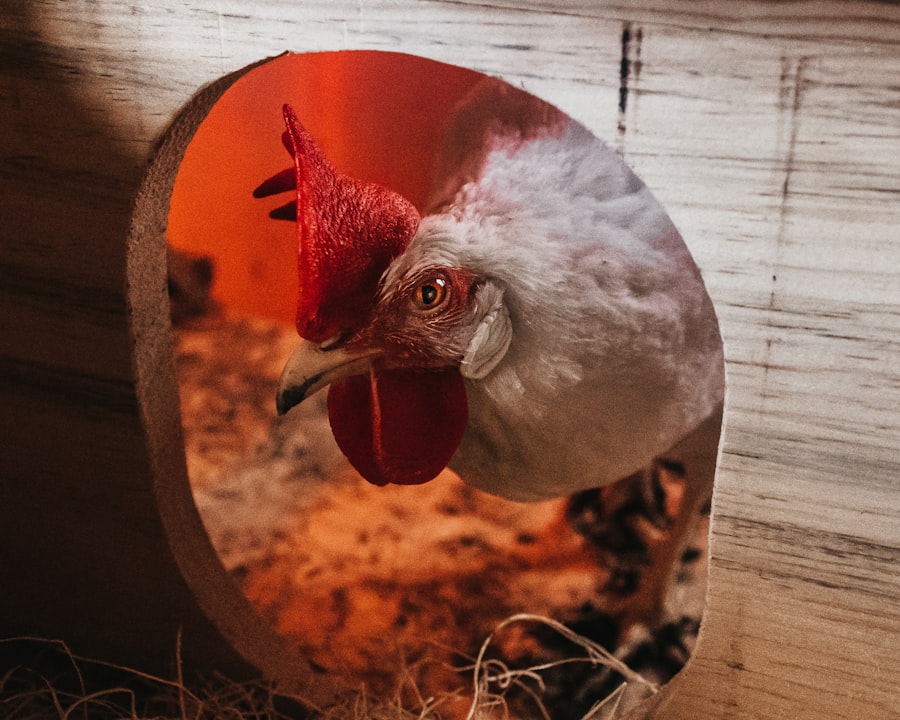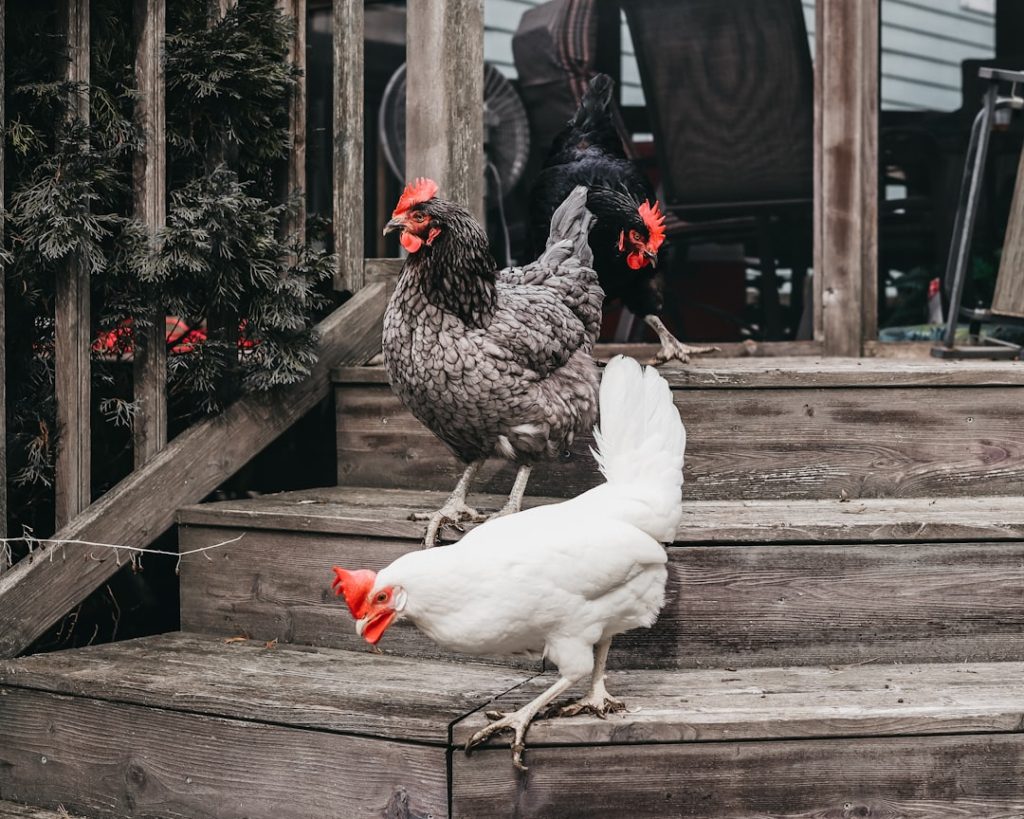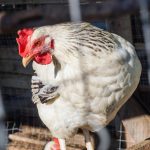Creating a safe and comfortable environment for your flock of birds is essential for their well-being. This involves providing a secure and sturdy enclosure that protects them from predators and weather elements. The enclosure should be constructed with high-quality materials and free from sharp edges or potential hazards.
Adequate perches, nesting boxes, and hiding spots are important for the birds’ comfort and security. Maintaining a clean living space is crucial for bird health. Regular cleaning of the enclosure and provision of fresh bedding helps prevent the buildup of bacteria and parasites, which can cause health issues.
Proper ventilation and temperature control are also important for creating a comfortable environment. The enclosure should be spacious enough to allow birds to move freely and engage in natural behaviors. Regular inspections for wear and tear, followed by necessary repairs, are essential to maintain the enclosure’s safety.
By focusing on these aspects, you can create an environment that promotes the overall health, happiness, and well-being of your flock.
Table of Contents
- 1 Providing Adequate Space and Roaming Areas
- 2 Establishing a Consistent Routine
- 3 Minimizing Loud Noises and Sudden Movements
- 4 Offering Enrichment and Entertainment
- 5 Monitoring and Managing Flock Dynamics
- 6 Seeking Professional Advice if Necessary
- 7 FAQs
- 7.1 What are some common signs of stress in chickens?
- 7.2 How can I keep my chickens calm during handling?
- 7.3 What environmental factors can contribute to chicken stress?
- 7.4 Are there any natural remedies to help keep chickens calm?
- 7.5 How can I reduce stress during transportation for my chickens?
Key Takeaways
- Creating a safe and comfortable environment is essential for the well-being of your flock.
- Providing adequate space and roaming areas allows birds to exhibit natural behaviors and reduces stress.
- Establishing a consistent routine helps birds feel secure and reduces anxiety.
- Minimizing loud noises and sudden movements can help prevent stress and fear in the flock.
- Offering enrichment and entertainment keeps birds mentally stimulated and prevents boredom.
- Monitoring and managing flock dynamics is important to prevent aggression and ensure a harmonious environment.
- Seeking professional advice if necessary can help address any behavioral or health concerns in the flock.
Providing Adequate Space and Roaming Areas
Importance of Outdoor Roaming Areas
In addition to providing ample space within the enclosure, it’s also beneficial to allow your birds access to outdoor roaming areas when possible. This could include a secure outdoor aviary or supervised free-range time in a safe and enclosed area. Outdoor roaming areas provide additional space for your birds to explore, forage, and soak up natural sunlight, which is essential for their overall health.
Encouraging Movement and Exercise
Furthermore, providing a variety of perches, branches, and climbing structures within the enclosure will encourage your birds to move around and exercise. These elements also provide mental stimulation and enrichment, which is important for their overall well-being.
Ensuring the Health and Happiness of Your Flock
By providing adequate space and roaming areas, you can help ensure that your flock of birds remains physically and mentally healthy. Providing a spacious enclosure, access to outdoor roaming areas, and incorporating a variety of perches, branches, and climbing structures will encourage movement, exercise, and mental enrichment, ultimately leading to happy and healthy birds.
Establishing a Consistent Routine

Establishing a consistent routine for your flock of birds is important for their overall well-being. Birds thrive on routine and predictability, so it’s beneficial to establish regular feeding times, cleaning schedules, and social interactions. This helps create a sense of security and stability for your birds, which can reduce stress and anxiety.
Additionally, establishing a consistent routine can help with training and behavior management. Birds are intelligent creatures that respond well to routine-based training methods. By consistently reinforcing positive behaviors and providing regular social interactions, you can help foster a strong bond with your birds and encourage desirable behaviors.
Furthermore, maintaining a consistent routine can also help with monitoring the health of your flock. By establishing regular observation times and health checks, you can quickly identify any changes in behavior or physical condition that may indicate an underlying health issue. By establishing a consistent routine, you can help promote the overall well-being of your flock of birds.
Establishing a consistent routine for your flock of birds is essential for their well-being. Birds thrive on routine and predictability, so it’s beneficial to establish regular feeding times, cleaning schedules, and social interactions. This helps create a sense of security and stability for your birds, which can reduce stress and anxiety.
Additionally, maintaining a consistent routine can help with training and behavior management. Birds respond well to routine-based training methods, so by consistently reinforcing positive behaviors and providing regular social interactions, you can help foster a strong bond with your birds and encourage desirable behaviors. Furthermore, maintaining a consistent routine can also help with monitoring the health of your flock.
By establishing regular observation times and health checks, you can quickly identify any changes in behavior or physical condition that may indicate an underlying health issue. By establishing a consistent routine, you can help promote the overall well-being of your flock of birds.
Minimizing Loud Noises and Sudden Movements
Minimizing loud noises and sudden movements is important for creating a calm and stress-free environment for your flock of birds. Birds are sensitive to their surroundings and can easily become startled or stressed by loud noises or sudden movements. Therefore, it’s important to minimize these disturbances to help keep your birds feeling safe and secure.
One way to minimize loud noises is by placing the bird enclosure in a quiet area away from high-traffic zones or noisy machinery. Additionally, being mindful of loud activities such as vacuuming or construction work near the bird enclosure can help reduce stress for your flock. Similarly, avoiding sudden movements or gestures when interacting with your birds can help them feel more at ease in their environment.
Furthermore, providing hiding spots within the enclosure can give your birds a sense of security when they feel threatened by loud noises or sudden movements. This could include natural hiding spots such as dense foliage or artificial shelters within the enclosure. By minimizing loud noises and sudden movements, you can help create a peaceful environment that promotes the well-being of your flock.
Minimizing loud noises and sudden movements is crucial for creating a calm and stress-free environment for your flock of birds. Birds are sensitive creatures that can easily become startled or stressed by loud noises or sudden movements. Therefore, it’s important to minimize these disturbances to help keep your birds feeling safe and secure.
One way to minimize loud noises is by placing the bird enclosure in a quiet area away from high-traffic zones or noisy machinery. Additionally, being mindful of loud activities such as vacuuming or construction work near the bird enclosure can help reduce stress for your flock. Similarly, avoiding sudden movements or gestures when interacting with your birds can help them feel more at ease in their environment.
Furthermore, providing hiding spots within the enclosure can give your birds a sense of security when they feel threatened by loud noises or sudden movements. This could include natural hiding spots such as dense foliage or artificial shelters within the enclosure. By minimizing loud noises and sudden movements, you can help create a peaceful environment that promotes the well-being of your flock.
Offering Enrichment and Entertainment
Offering enrichment and entertainment is important for keeping your flock of birds mentally stimulated and engaged. Birds are intelligent creatures that require mental stimulation to prevent boredom and behavioral issues. Providing a variety of toys, puzzles, and interactive feeders within the enclosure can help keep your birds entertained while encouraging natural behaviors such as foraging and problem-solving.
Additionally, offering novel experiences such as introducing new perches or rearranging the layout of the enclosure can provide mental enrichment for your birds. This helps prevent boredom and encourages exploration within their environment. Furthermore, providing access to natural elements such as branches, foliage, or bird-safe plants can offer sensory stimulation for your birds.
Furthermore, incorporating regular social interactions with your birds can provide mental stimulation and enrichment. Spending time interacting with your flock through training sessions or simply observing their natural behaviors can help strengthen the bond between you and your birds while keeping them mentally engaged. By offering enrichment and entertainment, you can help ensure that your flock remains mentally stimulated and happy.
Offering enrichment and entertainment is crucial for keeping your flock of birds mentally stimulated and engaged. Birds are intelligent creatures that require mental stimulation to prevent boredom and behavioral issues. Providing a variety of toys, puzzles, and interactive feeders within the enclosure can help keep your birds entertained while encouraging natural behaviors such as foraging and problem-solving.
Additionally, offering novel experiences such as introducing new perches or rearranging the layout of the enclosure can provide mental enrichment for your birds. This helps prevent boredom and encourages exploration within their environment. Furthermore, providing access to natural elements such as branches, foliage, or bird-safe plants can offer sensory stimulation for your birds.
Furthermore, incorporating regular social interactions with your birds can provide mental stimulation and enrichment. Spending time interacting with your flock through training sessions or simply observing their natural behaviors can help strengthen the bond between you and your birds while keeping them mentally engaged. By offering enrichment and entertainment, you can help ensure that your flock remains mentally stimulated and happy.
Monitoring and Managing Flock Dynamics

Understanding Flock Hierarchies
Additionally, being mindful of individual bird personalities and hierarchies within the flock can help you anticipate potential conflicts before they escalate. This could involve separating aggressive individuals or providing additional resources such as food dishes or perches to reduce competition within the group.
Providing a Harmonious Environment
Furthermore, providing ample space within the enclosure can help minimize territorial disputes among flock members. This includes offering multiple feeding stations, perches at varying heights, and hiding spots to allow each bird to have their own space when needed.
Maintaining Peaceful Coexistence
By monitoring and managing flock dynamics, you can help maintain a peaceful coexistence within your bird flock. By being proactive and attentive to the needs of your birds, you can create a harmonious and stress-free environment for your feathered friends to thrive.
Seeking Professional Advice if Necessary
Seeking professional advice if necessary is important for ensuring the health and well-being of your bird flock. If you notice any concerning changes in behavior or physical condition among your birds, it’s crucial to seek guidance from a qualified avian veterinarian or experienced bird behaviorist. Additionally, if you’re experiencing challenges with managing flock dynamics or addressing behavioral issues within your bird flock, seeking advice from professionals who specialize in avian care can provide valuable insights and guidance.
Furthermore, staying informed about best practices in bird care through reputable sources such as avian care organizations or publications can also provide valuable knowledge for maintaining the health and well-being of your bird flock. Seeking professional advice if necessary is important for ensuring the health and well-being of your bird flock. If you notice any concerning changes in behavior or physical condition among your birds, it’s crucial to seek guidance from a qualified avian veterinarian or experienced bird behaviorist.
Additionally, if you’re experiencing challenges with managing flock dynamics or addressing behavioral issues within your bird flock, seeking advice from professionals who specialize in avian care can provide valuable insights and guidance. Furthermore, staying informed about best practices in bird care through reputable sources such as avian care organizations or publications can also provide valuable knowledge for maintaining the health and well-being of your bird flock.
If you’re looking for ways to keep your chickens calm, you might want to consider adding a chicken coop trampoline to their living space. This unique idea is explored in more detail in an article on Poultry Wizard’s website, which discusses the benefits of providing a trampoline for chickens to jump and play on. Check out the article here for more information on this innovative approach to keeping your feathered friends happy and relaxed.
FAQs
What are some common signs of stress in chickens?
Some common signs of stress in chickens include feather picking, decreased egg production, aggression, and excessive vocalization.
How can I keep my chickens calm during handling?
To keep your chickens calm during handling, it’s important to approach them calmly and confidently, avoid sudden movements, and handle them gently and securely.
What environmental factors can contribute to chicken stress?
Environmental factors that can contribute to chicken stress include overcrowding, extreme temperatures, poor ventilation, and lack of access to food and water.
Are there any natural remedies to help keep chickens calm?
Some natural remedies to help keep chickens calm include providing a comfortable and secure coop, offering enrichment activities such as dust baths and foraging opportunities, and using calming herbs like lavender and chamomile.
How can I reduce stress during transportation for my chickens?
To reduce stress during transportation for your chickens, it’s important to provide adequate ventilation, secure the birds in a well-ventilated and cushioned container, and avoid overcrowding during transport.
Meet Walter, the feathered-friend fanatic of Florida! Nestled in the sunshine state, Walter struts through life with his feathered companions, clucking his way to happiness. With a coop that’s fancier than a five-star hotel, he’s the Don Juan of the chicken world. When he’s not teaching his hens to do the cha-cha, you’ll find him in a heated debate with his prized rooster, Sir Clucks-a-Lot. Walter’s poultry passion is no yolk; he’s the sunny-side-up guy you never knew you needed in your flock of friends!







